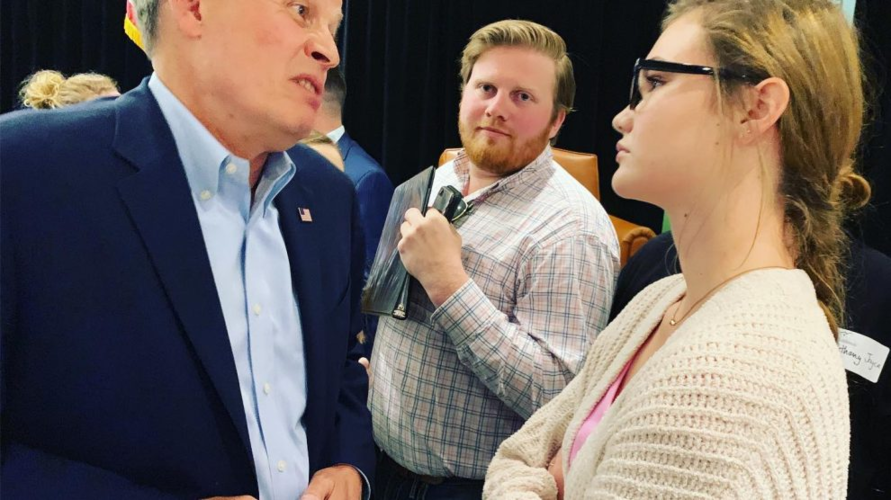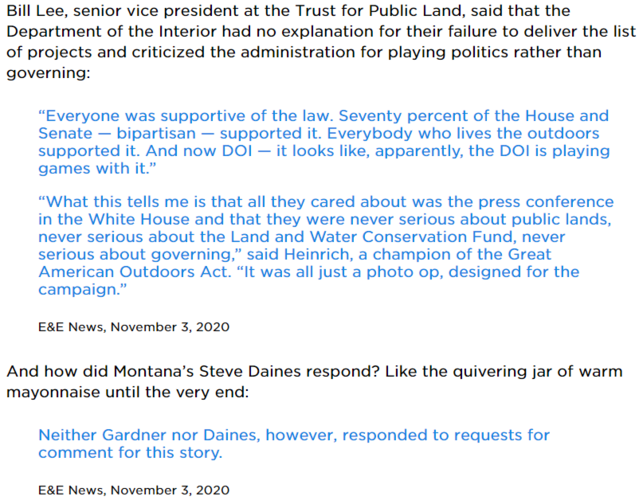
PUBLIC LANDS: Interior misses Great American Outdoors Act deadline
A triumphant bill-signing ceremony at the White House, where Republicans allowed President Trump to compare himself to Teddy Roosevelt. Enough talking points to fill several campaign ads for two of the Senate's most vulnerable Republican incumbents.
This story was updated at 9:48 a.m. EST.
A triumphant bill-signing ceremony at the White House, where Republicans allowed President Trump to compare himself to Teddy Roosevelt. Enough talking points to fill several campaign ads for two of the Senate's most vulnerable Republican incumbents.
After the pomp and circumstance of enacting the Great American Outdoors Act — the "holy grail" of conservation legislation for which advocates have been clamoring for decades — the Trump administration has missed a key deadline for implementation of the landmark law.
Furthermore, the administration is offering no guidance about when it plans to turn over the outstanding information, which is necessary for states to move forward on funding outdoor recreation projects and securing federal land acquisitions.
"They failed to deliver a list to Congress, and the Interior Department's apparent lack of action is as disappointing as it is confusing," said Bill Lee, senior vice president of policy, advocacy and government relations for the Trust for Public Land.
"To call this a disappointment," Sen. Martin Heinrich (D-N.M.) said in agreement, "is charitable."
The Great American Outdoors Act, which was enacted in August, fully and permanently funded the Land and Water Conservation Fund at $900 million annually. It also created a five-year trust fund to address $20 billion worth of deferred maintenance projects at national parks and on public lands.
Yesterday — Election Day eve — was the deadline for Interior to submit to Congress two separate lists of priority projects for fiscal 2021: one for the LWCF, one for the deferred maintenance backlog (E&E Daily, Oct. 28).
The department has submitted the deferred maintenance backlog priority list; the LWCF list is nowhere to be found.
Congressional aides who participated in a call with Interior officials yesterday afternoon were given no details about why the LWCF list was not provided to elected officials — what the holdup was and when they could expect to see something.
"They have no idea when those are going to be submitted," one aide told E&E News.
In a call two hours later with representatives of nonprofits and advocacy groups that worked closely with the administration and Congress on the Great American Outdoors Act, Interior Secretary David Bernhardt also provided no information.
"They ducked, bobbed and weaved and didn't answer the question about where the LWCF lists are," said one source who participated in the call.
Lee, who was also on the call, said Bernhardt told call participants that he interpreted the law as stating that the president was responsible for coming up with the LWCF list, which Lee called "ridiculous."
The Interior press office did not respond to requests for comment.
"Coloradans worked for years to secure full and permanent funding for the Land and Water Conservation Fund. The fact that the Trump Administration is failing to follow through and meet LWCF deadlines, while not surprising, demonstrates a serious lack of commitment to conservation," Sen. Michael Bennet (D-Colo.) said in a statement. "Apparently they've already lost their interest in taking care of our public lands."
'Playing games'
Multiple sources told E&E News they hadn't been expecting the LWCF list from Interior to differ enormously from the version it sent to lawmakers back in April.
That list included more than $116 million for 61 projects requested by the Bureau of Land Management, National Park Service, and Fish and Wildlife Service, as well as $23.6 million set aside for the federal government to acquire six parcels of public land.
However, an updated list, or even a resubmission of the same list, is necessary for compliance with the Great American Outdoors Act.
LWCF dollars are used for a combination of outdoor recreation projects and federal land acquisitions. Communities and industries are anxious for LWCF money to start flowing to states during an economic crisis caused by the coronavirus pandemic, and conservationists are concerned that a lack of certainty over funding will cause delicate land sales to fall through (E&E Daily, Oct. 22).
Sources were also warning last week that if there were major discrepancies between the two lists — or if no list materialized at all — that would be a red flag that something was wrong.
Rumors were circulating yesterday that the list was outstanding because Bernhardt was up to something. According to some sources, he had hinted at one point that he would be releasing an implementation memo that might restrict how LWCF dollars can be used.
Lee wouldn't speculate but said the list's absence "sends a really troubling message."
"Everyone was supportive of the law. Seventy percent of the House and Senate — bipartisan — supported it. Everybody who lives the outdoors supported it. And now DOI — it looks like, apparently, the DOI is playing games with it."
"What this tells me is that all they cared about was the press conference in the White House and that they were never serious about public lands, never serious about the Land and Water Conservation Fund, never serious about governing," said Heinrich, a champion of the Great American Outdoors Act. "It was all just a photo op, designed for the campaign."
While Trump himself has not campaigned on the issue extensively, his team has highlighted the act as among the administration's major environmental achievements as it has faced criticisms of regulatory rollbacks and initiatives that are harmful to the environment (E&E Daily, Sept. 9).
The measure has been most widely used as a key plank for two Western Republican senators embroiled in tough reelection bids.
Both Republican Sens. Cory Gardner of Colorado and Steve Daines of Montana have highlighted the legislation in television and video ads.
When Senate Majority Leader Mitch McConnell (R-Ky.) put the bill on the floor this summer, he made sure they were the faces of the effort and allowed them to essentially take all credit for the measure's passage (Greenwire, Aug. 4).
"Cory Gardner's campaign is ending with ... President Trump failing to deliver on the conservation legislation Gardner has touted in misleading ads for months — breaking his self-proclaimed 'Gardner's Law' on Day 1, which happens to land on the same day Coloradans will vote him out of office," said Alyssa Roberts, a spokeswoman for former Colorado Gov. John Hickenlooper (D), who is challenging Gardner for his Senate seat.
The Republican lawmaker has referred to the Great American Outdoors Act as "Gardner's Law" in a television ad promoting his candidacy. (Greenwire, Aug. 12).
Neither Gardner nor Daines, however, responded to requests for comment for this story.
Ultimately, Heinrich noted that despite the White House's skipped deadline for the LWCF priority list, Congress can still appropriate funds under the Great American Outdoors Act when it returns for a lame-duck session later this month.
"The good news is the law is the law," he said, adding, "Hopefully, we'll have a different White House to deal with depending on how things go" on Election Day.
Reporter Jennifer Yachnin contributed.











